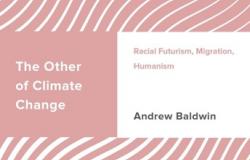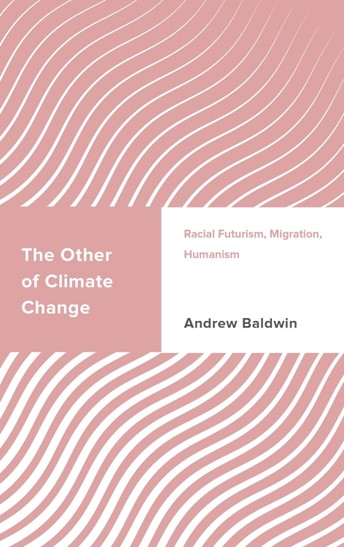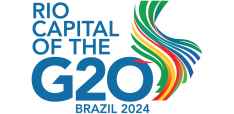Book Review - The Other of Climate Change: Racial Futurism, Migration, Humanism

The Other of Climate Change: Racial Futurism, Migration, Humanism by Andrew Baldwin. Lanham and London: Rowman and Littlefield 2022. 224 pp., £92 hardcover 978-1-78661-450-6, £30 paperback 978-1-5381-9648-9, £35 e-book 978-1-78661-451-3
Where my own work tends to examine how climate change came to be through social fissures rooted in European expansion and colonialism[1], The Other of Climate Change takes these historical lessons forward to problematize future-oriented narratives operating now. It identifies and brilliantly traces an international discourse on climate change and migration, while highlighting the discourse’s characteristic reliance on the future perfect tense. Pushing back against the oft heard refrain that migration “either will or may be amplified under conditions of climate change,” Andrew Baldwin convincingly calls out the raced and colonial obfuscations of that undeterminable conclusion. Building on Chakrabarty’s view that the Enlightenment figure of the human “was imagined as the agent of world history, capable of transforming the world through the arts, science and philosophy…” (p.3), Baldwin deploys a rigorous analytic of race and racism to argue that Blackness, cast out and othered through humanism’s consolidation, lurks on the outskirts of humanism’s reckoning with itself in the face of its responsibility for climate change. Arguing that the climate migrant/refugee bears a striking resemblance to the peripheral position of Blackness in humanism, Baldwin teases out the racialized underpinnings of liberalism’s attempt to harken the climate migrant/refugee into being and to consolidate itself in antagonistic relation to this figure.
 Essentially, The Other of Climate Change explores the racialisation of the political relation between climate change and migration. Racialization, as Baldwin highlights, should not be understood in this context as taking race to be an objective category. Rather, it functions as a means of differentiating people by attributing meaning to different markers, like skin colour. For Baldwin, the discourse on climate change and migration reproduces “a racialized social hierarchy between white humanism and … the racial other of climate change.” (xv) Race, in this context, naturalises “social relations under capitalism,” and legitimises “uneven, violent constructions of difference by explaining these as a function of nature, as opposed to social forces …” (7).
Essentially, The Other of Climate Change explores the racialisation of the political relation between climate change and migration. Racialization, as Baldwin highlights, should not be understood in this context as taking race to be an objective category. Rather, it functions as a means of differentiating people by attributing meaning to different markers, like skin colour. For Baldwin, the discourse on climate change and migration reproduces “a racialized social hierarchy between white humanism and … the racial other of climate change.” (xv) Race, in this context, naturalises “social relations under capitalism,” and legitimises “uneven, violent constructions of difference by explaining these as a function of nature, as opposed to social forces …” (7).
Baldwin then develops the concept of Racial Futurism to refer to “a form of racial rule which stakes claim on the future by constructing the racial other as that which could materialise if efforts are not taken in the present to pre-empt that future” (1). He compellingly writes that “Unlike prevailing theories of racialization, which tends to construct the racial other in the idiom of different-from, the racial idiom at stake in racial futurism is that of the yet-to-come.” (1) Describing anti-blackness as “the structural antagonism that founds humanism” (16), Baldwin likens Blackness to the figure of the climate/migrant refugee” (16). For Baldwin, the figure of the climate migrant/refugee is important because of how it marks the boundary between governability and ungovernability, and “because it signifies the breakdown of this order of governance.” (20) Racial futurism is, thus, “an anticipatory form of anti-Blackness, preoccupied with knowing in advance who will enter into racial categorisation, who will become a climate migration/refugee and thus who might become a problem.” (22) Yet, as the book asserts, “no amount of knowledge that explains migration as a function of climate change will ever be sufficient to supersede the underlying historical geographical dimensions of migration” (14). Who then do these discourses serve?
Certain parts of the book resonated strongly with me, an environmental social scientist from the Global South working in a School of International Relations in the country from which her own gained independence. The book’s elaboration of neo-environmental determinism as “not racism” is one such part. This section is striking in its attention to questions of who exactly gets to determine what racism is and is not. Also notable is Baldwin’s explanation of how the racism underpinning environmental determinist approaches are simultaneously denied and replicated in the discourse of climate change and migration, as is also pointed out by Jan Selby in recent work at the intersection of political ecology and climate change[2]. Notable too is Baldwin’s general approach of, put casually, saying the quiet part of what he describes as racist ‘white affect’ out loud.
Especially outstanding for me was the book’s critique of the whiteness of the ‘International’, a term Baldwin uses to refer to the institutions, regulations and regimes of knowledge underpinning International Relations as a discipline and practice. Since the climate migrant/refugee “is articulated as an object of governance” (17) at the level of the International, Baldwin focuses on how this spatial construction and the discipline of International Relations function in support of whiteness – putting into words something of which I am well aware but had never quite articulated as such. He pinpointed the “presentiment of disorder”, that followed World War 2 and the formal period of decolonization when many former British colonies gained independence. This ‘presentiment of disorder’, he writes, was “above all about race, driven by the fear that white ascendancy was about to be turned upside-down, and that, in the final reckoning, the natives were to have their day” (57). For Baldwin, similar anxieties are at work when some writers assert that, “Climate change threatens to overturn an enduring racial hierarchy in which “civilised human society”- for them, the West - is understood to govern over the majority world” (58).
He argues that “white racial rule adapts to the global climate change by mobilising both the structure of the international … and a set of representational practises associated with international relations (IR)” (60). He sets about excavating the “underlying Eurocentrism” (61) of the International through two recurring moves by the discipline of IR. The first is its tendency to represent its object (nation states) as building blocks for understanding the world in a way that masks its European imperialist roots. The second is its reliance on empiricism, which leaves it blind to how historical conditions and structural racisms shape the empirical indicators it can recognize. Thus, Baldwin writes that “by constructing the climate change migration relation as international, the field’s minimal historiography invites us to forget how contemporary knowledge about migration and environmental change is itself embedded within a racist genealogy traceable at least to the early 19th century. The space of the International enables this forgetting to occur” (68) – all claims with which I wholeheartedly agree.
Yet, there were points on which I remain unclear. While I find the argument convincing on its own terms, I struggled with its construction through myriad sites and different theoretical positions. I found it difficult to put the different concepts in hierarchical/spatial relation to each other. It was clear, for example, that humanism is central to Baldwin’s argument. However, the relationship between racial futurism and “discourse” was much less clear. I found the myriad concepts and untranslatability of these concepts into my pre-existing (social scientific) mental scaffold quite challenging.
I questioned also the existence of “the” climate change and migration discourse (‘discourse’ could especially have been better defined). While the discourse problematized in the book does appear to exist, the extent to which “the” can be attributed to a discourse as multifaceted and multi-sited as this one is questionable. Might other (facets of the) climate change and migration discourse(s) not exist outside the Euro-Western discourse problematized in this book?
Finally, while Baldwin poignantly observed that post capitalist democratic political futures are likely to be foreclosed without analyses of race and racism supported by “meaningful cross race political solidarities” (xvii), I would have liked a clear statement on why exactly this is so. Nonetheless, this book represents a significant contribution to research on climate change and migration. It should be required reading for scholars of the discipline it targets and for International Relations scholars open to critical discourse on the relationship between the International and Climate Change.
Dr. Yolanda Ariadne Collins is a Lecturer in the School of International Relations at the University of St Andrews.
References
Collins, Yolanda Ariadne. Forests of Refuge: Decolonizing Environmental Governance in the Amazonian Guiana Shield. Univ of California Press, 2024.
Selby, Jan, Gabrielle Daoust, and Clemens Hoffmann. Divided Environments: An International Political Ecology of Climate Change, Water and Security. Cambridge University Press, 2022.
[1] Yolanda Ariadne Collins, Forests of Refuge: Decolonizing Environmental Governance in the Amazonian Guiana Shield (Univ of California Press, 2024),
[2] Jan Selby, Gabrielle Daoust, and Clemens Hoffmann, Divided Environments: An International Political Ecology of Climate Change, Water and Security (Cambridge University Press, 2022), https://books.google.com/books?hl=en&lr=&id=_Up6EAAAQBAJ&oi=fnd&pg=PR11&dq=divided+environments&ots=xF8RzEbNuv&sig=cppsh4-xFyWk8MKdjpMzMZ--d4g.


